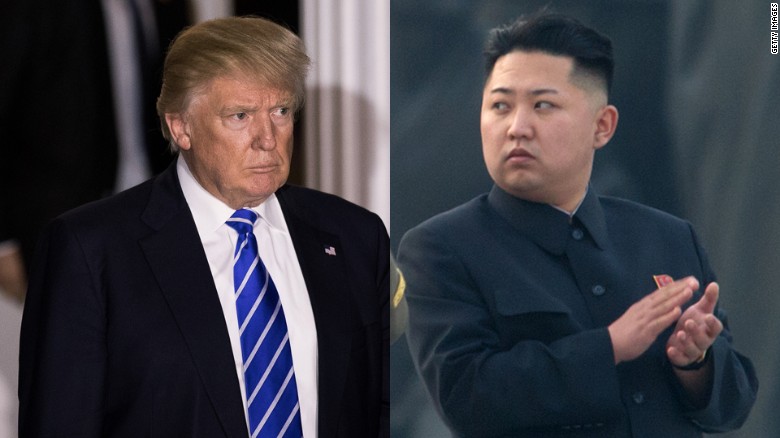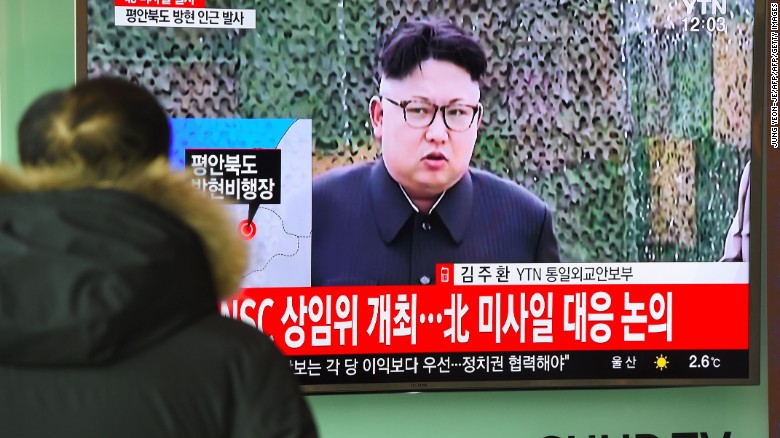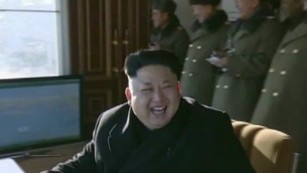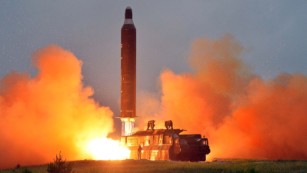North Korea calls ballistic missile test-fire a success
North Korea says it has successfully completed the launch of a new ballistic missile, according to state media.
The Pukguksong-2, a medium long-range ballistic missile and a previously unpublicized part of its arsenal, was test fired on Sunday under the supervision of North Korean leader Kim Jong Un, according to North Korea's Korean Central News Agency, KCNA.
Kim was present at the site and personally gave the order for the launch, which was the first missile test by Pyongyang since US President Donald Trump took office, KCNA reported.
The agency described the missile as a "Korean style new type strategic weapon system."
South Korea and the United States confirmed the launch Sunday.
A US official said the missile traveled 500 kilometers (310 miles) before landing in the Sea of Japan, also known as the East Sea, and that it was launched from North Pyongan province.
Intermediate-range ballistic missiles typically travel from 3,000 to 5,500 kilometers (1,864 to 3,417 miles).
The Pukguksong-2 is believed to have used a solid-fuel propelled engine which enables faster launch and increases the mobility of the launch process, according to a spokesman of the South Korean Joint Chiefs of Staff spokesman.
The Joint Chiefs also believe that Pyongyang employed a cold-launching system, where the missile is lifted off the ground using pressure and then ignited mid-flight, as opposed to igniting it on the ground -- which is said to be less stable, the spokesman said.
Emergency meetings
The United Nations Security Council said it plans hold consultations on an "urgent basis" Monday afternoon regarding North Korea, according to the US Mission to the United Nations. The meeting was requested by the United States, South Korea and Japan -- whose Prime Minister, Shinzo Abe, was visiting President Trump in the United States when the launch occurred.
"North Korea's most recent missile launch is absolutely intolerable. North Korea must fully comply with the relevant UN Security Council resolutions," Abe told a news conference at Palm Beach, Florida.
North Korea's missile launch: Japan, are you watching?
North Korea is prohibited from carrying out ballistic missile launches under UN Security Council resolutions aimed in part at curbing the country's development of nuclear weapons.
Trump spoke after Abe and gave a one-sentence statement: "I just want everybody to understand and fully know that the United States of America stands behind Japan, its great ally, 100%."
Japan's chief Cabinet secretary, Yoshihide Suga, said the fact the launch came as Abe met with Trump made it "a clear provocation to Japan and the region."
Tokyo has already lodged protests against North Korea via its embassy in Beijing, he said.
'Punitive actions'
The KCNA said the missile capable of carrying a nuclear warhead and capable of "evading interception." The report by KCNA said Kim "expressed great satisfaction over the possession of another powerful nuclear attack means which adds to the tremendous might of the country."
They ruled out the possibility that it was a longer-range intercontinental ballistic missile, or ICBM -- which are usually designed to carry nuclear warheads -- based on the flight distance.
KCNA said the launch "was conducted by the high-angle launching method instead of firing range, taking the security of the neighboring countries into consideration."
Acting South Korean President Hwang Kyo-ahn said: "The South Korean government and the international community are working together to take punitive actions appropriate for this launch."
Trump's national security adviser, Michael Flynn, spoke to his South Korean counterpart Kim Kwan Jin, according to the South Korean President's office. They condemned the launch and agreed "to seek all possible options" to deter Pyongyang in the future.
China, North Korea's neighbor and most important strategic partner, has not yet commented on the launch.
North Korea conducted an unprecedented number of missile tests in 2016 and a satellite launch that experts said was a sign it has cleared significant hurdles toward ICBM technology. But until Sunday, it hadn't tested a ballistic missile since October 20.

What could Trump do about North Korea?
Step toward missile that can hit US?
In January, US and South Korean officials told CNN that North Korea might be readying two ICBMs for a test launch in the near future, though some analysts dispute how close Pyongang actually is to testing such a missile.
Retired Lt. Gen. Mark Hertling said Sunday's test would help the North Koreans improve their missile technology, and could help in their development of an ICBM.
"That's the goal of the North Korean politicians," he said.
"This intermediate ballistic missile is certainly dangerous. It has a greater range than some of the Musudan missiles that they have been testing prior to that. And it's not only a concern for the United States to hit the mainland, but it also has concerns for all of our Asia partners."
Why would the US not shoot down a North Korean missile?
Pyongyang has been steadily working to improve its missile and weapons capability, conducting a fifth nuclear test in September.
Many experts think North Korea is a ways away from being able to put a nuclear warhead on its missiles, which would make it a global threat. Still, US commanders say they need to be prepared for the possibility.
"Combining nuclear warheads with ballistic missile technology in the hands of a volatile leader like Kim Jong Un is a recipe for disaster," Adm. Harry Harris, the head of the US military's Pacific Command, said in a December speech.
News Courtesy: www.cnn.com













